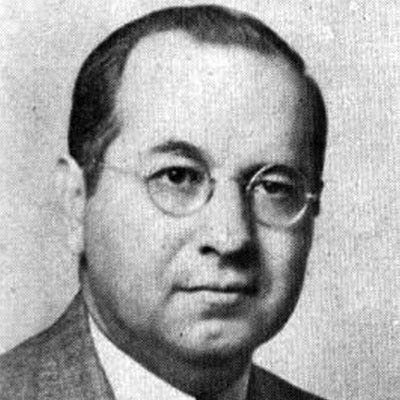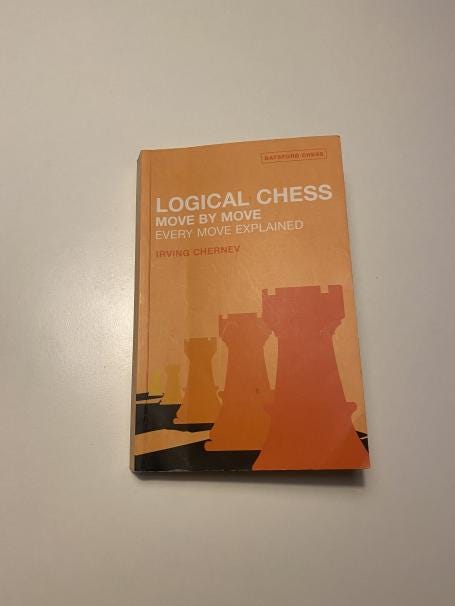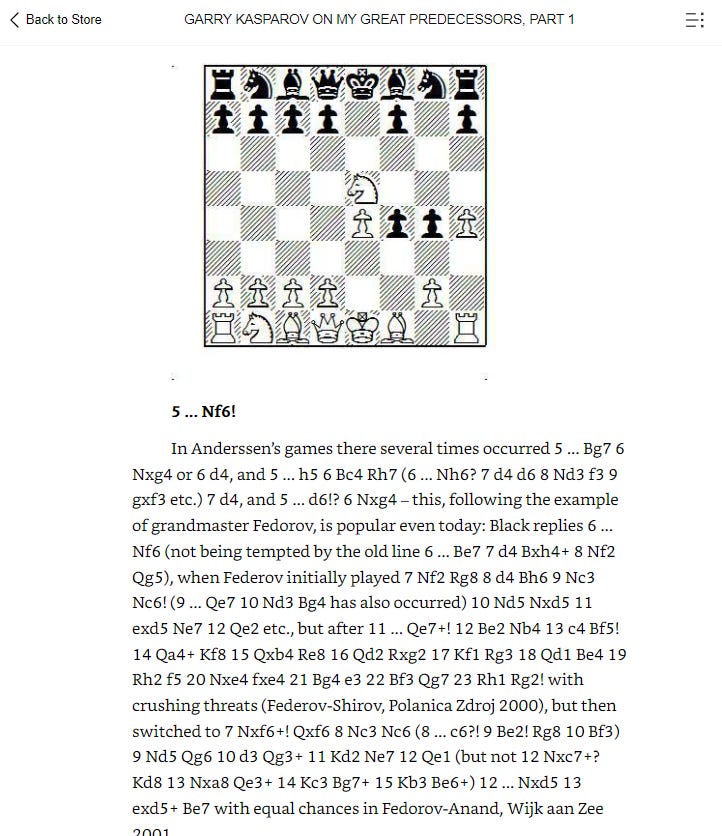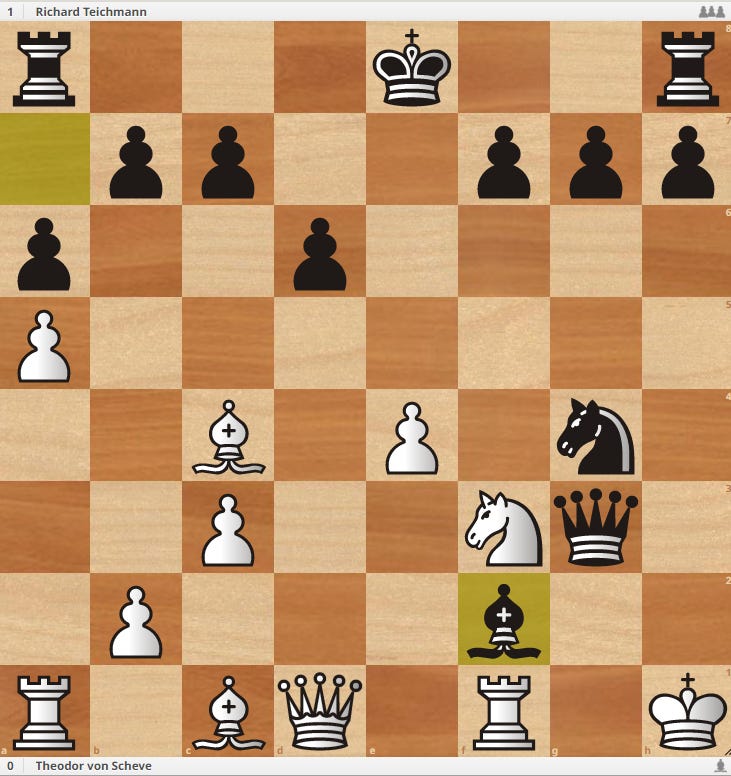My First Chess Book - Logical Chess by Irving Chernev
From Beginner to 2000 on Chess.com
Hi everyone,
I took a little break last week. I got really interested in learning to code since I now can ask GPT to help me out, and of course, I’m trying to code something that is chess related. But it takes time to learn new things, so the writing got a little delayed.
But before we jump into this week’s newsletter I will just ask you a question about the Say Chess Training Group. I started sending out the Monday weekly update thread on the Substack Chat, so I just want to make sure it works for you.
Okay, enough housekeeping. Here is this week’s newsletter that will be part of the notes/chapters/research for my book project ‘From Beginner to 2000 on Chess.com’.
My First Chess Book - Logical Chess by Irving Chernev
Many aspiring chess players resort to books after falling in love with the game. So did I. One of the first books, if not the first, so the second, I bought, was Chernev’s ‘Logical Chess — Move by Move’.
The book functions almost like a membership card. You have to read it before you can enter the chess club. But why is this book so recommended and still ranks high on the chess book bestseller list 66 years after its publication in 1957?
Chernev was born in the Russian Empire, now Ukraine, in 1900. He came to Brooklyn, New York in 1907 with his parents and siblings, and it was in the United States that Chernev would become known as the expert on the chess world. He was not a grandmaster, but in 1950, Irving Chernev had a rating (inactive) of 2158 on the first rating list published by the USCF, definitely strong enough to teach the ideas of the games to the masses.1
The first few decades of the 20th century when Chernev entered adulthood were dominated by figures like Emanuel Lasker, José Capablanca, and Alexander Alekhine. During this time, chess theory was still in its early development, and the use of opening databases, engines, and Chessable was far from reality. Chess was primarily played in clubs, cafes, and over-the-board tournaments, with information being shared through books, newspapers, and word of mouth. It is this kind of vibe you will travel back to when reading the book.
After reading this you might object and call the book an antic relic with no use today. But one of the best things about ‘Logical Chess’ is the clear explanations for every move. Something that was true then and still is today. The book is designed to help beginners understand the reasoning behind each move in the featured games. By explaining every single move, even the first one, Chernev helps new players grasp the underlying principles and thought processes, allowing them to apply similar reasoning in their own games.
Let us compare it to a book that some might by mistake start out with ‘My Great Predecessors, Part 1’ by Kasparov. A book that will take you through chess history. Great! But the beginner will be surprised when they look at the annotation.
As you can see this is for advanced players and will not really help any beginner improve their understanding of the game. GM John Nunn said about one of Chernev’s other books The Most Instructive Games of Chess Ever Played:
‘When I was a young player, I read The Most Instructive Games of Chess Ever Played by Irving Chernev which made chess seem extremely easy. However, I then read Alekhine’s Best Games of Chess, which made chess seem impossibly difficult. I eventually discovered that the truth lies somewhere between the two.’
— GM John Nunn, New in Chess, 3/2002, page 982
Chernev’s emphasis on fundamental principles is what is important for beginners. Chernev focuses on teaching essential chess concepts, such as piece development, king safety, and pawn structure.
By illustrating these concepts through real games, beginners will be helped to comprehend and internalize these key principles.
Chernev's writing is known for its clarity, making complex ideas easy to understand for players of all levels, like Daniel Naroditsky, John Bartholomew, and Levy Rozman has mastered today on video. In some way, Chernev was the original master of this technique. For context check out Bartholomew in his series Climbing the Ladder on Youtube. The series started back in 2015 and is a great modern example of clear explanation with a focus on the fundamentals.
Chernevs engaging storytelling and instructive analysis make "Logical Chess" an enjoyable read, that is at least how I remember it reading it as a beginner. It of course helped that reading about games being played 100 years ago appealed to a history lover like myself. The book can however be a slow read for those who have moved beyond the beginner stage since the explaining might be a bit much for the advanced player. So timing is key when approaching this book (or other chess books).
The book is also old and not engine approved as you will see already in game one of the book, Von Scheve - Teichmann (1907). Chernev writes here when White resigned: “Black's threat was 18...Qh3+ 19. Nh2 Qxh2#. As 18. Rxf2 runs into 18...Nxf2#”
Maybe you can see the saving defense for White here?
Beginners shouldn't worry too much about oversights by strong writers. Rather, their focus should be on understanding the fundamental principles behind good chess moves and reducing their own oversights. Searching for hidden resources in complex positions is something you can do a little further down the road.
I hope I have convinced you about the benefits of reading Logical Chess as a beginner, but also emphasizes the importance of timing when choosing which chess books to read. When starting out, it's crucial to have guidance in selecting the right books, which is why I think Logical Chess is a popular and safe choice for beginners. However, as you progress, you'll need to learn how to identify which books are suitable for your skill level. For example, I have attempted to tackle books like Grandmaster Preparation: Calculation by Aagaard and Domination by Kasparyan, but soon realized that I was delusional and they were too challenging for me.
If you have read Logical Chess, please share your thoughts on it and when you picked it up on your chess journey.
/Martin
http://billwall.phpwebhosting.com/articles/chernev.htm
https://www.chesshistory.com/winter/extra/chernev.html









I loved this book!
Logical chess is a classic. It’s still good. The analysis doesn’t always hold up, but the principles, the meat of the book, are still good for beginners to intermediates. Love this book.